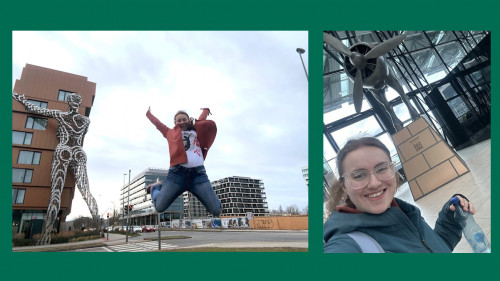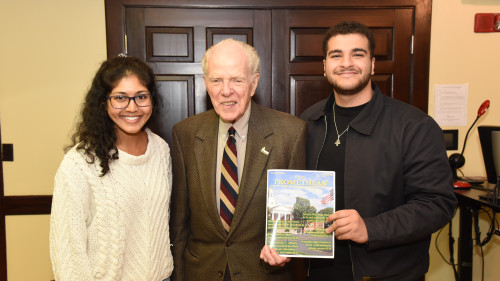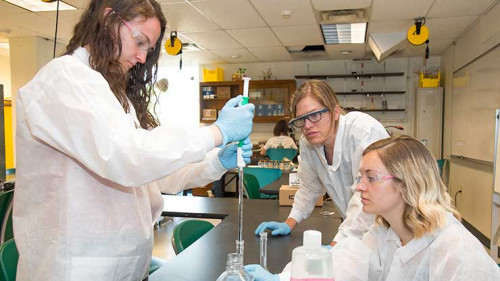
The break between semesters has been especially long this academic year, so the College offered an added learning experience this winter to promote skill-building, professional development and mentoring opportunities.
These virtual mini-courses called Learning Labs each ran for two weeks and featured synchronous and asynchronous instruction.
Jerry DeFrancisco ’68 DPS, LHD ’18, distinguished executive in residence, taught Servant Leadership, relating it to Franciscan values and principles. The students explored how servant leadership is defined, how it differs from other forms of leadership, and how it is applied.
“As a servant leader, your natural feeling will be to serve first,” said DeFrancisco. “Those who are led are your highest priority.”
This method, which he said is getting renewed attention in the corporate world at companies like Starbucks, Marriott and USAA, inverts the traditional pyramid model of leadership to emphasize listening, empathy, healing and awareness.
“Instead of being directive you are being supportive. The boss is a support manager. It works much better with today’s generation of employees. If you order people around, they quit.”
Milena Machado ’21 found servant leadership to be about having “vision, mind, and heart open.”
“It’s about connecting, building strong relationships and being a servant first, giving the necessary support to enhance human dynamics,” she said. “It strengthens the servant leadership role when someone becomes an agent of change, touching someone's life. As the St. Francis prayer says: ‘It is in giving that we receive.’”
Sam Hearn ’22 said the course provided an insightful and encouraging approach to leadership.
“Servant leadership puts employees and team members first in a way that maximizes their strengths and potential by viewing the person as a whole,” he said. “In doing so, leaders can increase overall productivity and efficiency. Not only is the whole person valued, but it helps to pave the way for employees to take what is learned and apply it to other areas that are in need of servant leadership.”
Allison Schultz, director of the Center for Academic Community Engagement, and Vera Eccarius- Kelly, Ph.D., professor of political science and international relations, taught Community Asset Mapping. This is a process where community members and researchers collectively record information considered essential for a thriving communal life. The creation of accessible maps (ranging from cartographic to narrative mapping) depends on the type of information members of communities identify as valued in their own neighborhood. It often includes information about citizen associations or community organizations, existing local institutions, city government, and private businesses.
Roja Ebrahimi MBA ’23 called community asset mapping “a powerful and fascinating instrument” that potentially can reverse the destiny of underserved communities and empower them. The students explored this subject in relation to a variety of current issues such as the vaccine rollout, food injustice, and refugees/immigrants problematics and settlement.
“I believe that an asset-based approach to community mobilization is absolutely indispensable in today’s corporate America, where profit-driven mindset and activities have been dismantling social and community networks especially for the last four decades,” said Ebrahimi. “This outlook has created alienated and marginalized neighborhoods that suffer from profound social injustice and exclusion. I highly recommend this study to my fellow MBA colleagues.”
Beth DeAngelis, senior director of the Sr. Thea Bowman Center for Women, taught Women’s Leadership. Her students explored the leadership style of three exemplary women who helped pave the way for women’s rights. Using their example, they developed three professional skills for leadership: self-awareness, emotional expression, and self-regard. They also considered power and the various ways one can exercise it.
Elham Malik ’23 said the course left her “feeling both engaged and prepared to be the best leader I possibly can be.”
“We were able to voice our opinions and learn how to take the proper steps to excel in our respective fields. I would recommend taking part in this training workshop regardless of your background or career path.”
Meg Schubmehl ’22 added, "It was a great way to learn more about myself and it has been one of my favorite things that I have been involved in on campus.”
Other Learning Labs included Internships, taught by Alicia Pepe, director of internships; and Mentoring Relationships, taught by Debra DelBelso, director of career education and professional development.

